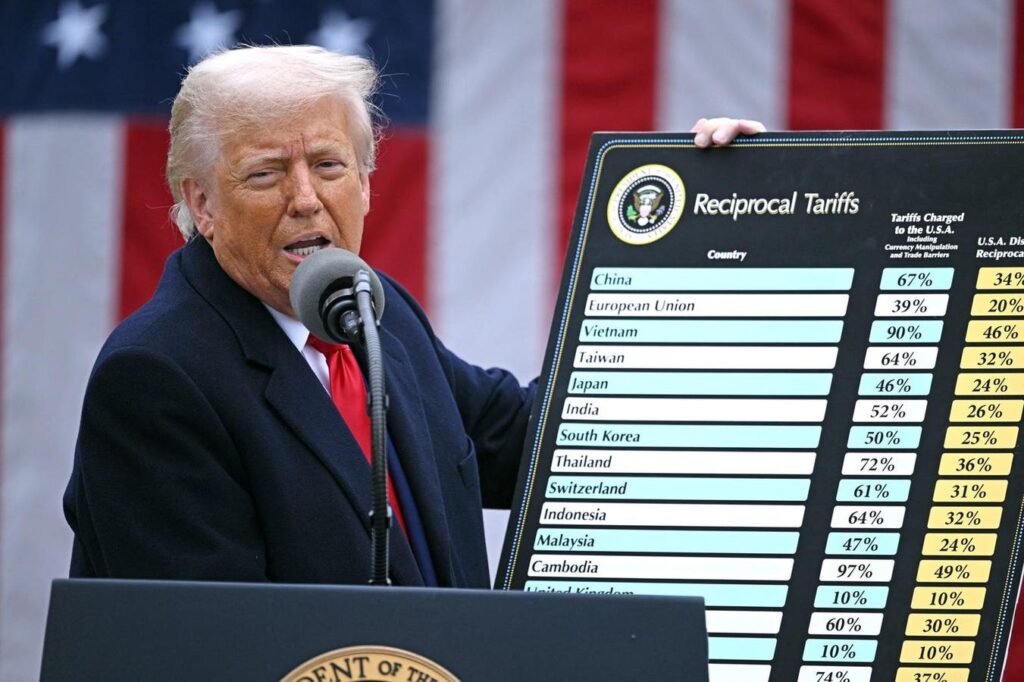The Trump administration’s so-called reciprocal tariffs on countries around the world announced April 2 will raise government revenue in 2025 by $290 billion, or o.95% of GDP, constituting the biggest tax hike since 1982. This is according to calculations by the Tax Foundation. While the U.S. government has claimed that tariffs are a tax on foreign entities, a tariff is paid by the importer, which could in the case of the new tariffs most likely be an American company. Tariffs are then expected to be passed on to that company’s clients and ultimately consumers to offset the importer’s higher cost. In any way, the tariff is completely or largely shouldered within the United States.
While the Tax Foundation used conventional tariff revenue estimates for its calculation, the increase in government revenue according to the dynamic model would be somewhat lower, at $244 billion, as it takes into account tariff-related losses to the tax base in the form of lowered personal and business income.
JPMorgan is even calling the new tariff regime the biggest tax hike since 1968, assuming that the overall U.S. tariff rate will increase to 22% in 2025, while the Tax Foundation assumes 18.8%. The financial services firm also said that the announcement raised the risk of a global recession from 40% to 60%. Many organizations, including those known for more conservative standpoints, criticized the tariffs, with libertarian think tank Cato Institute also calling out the “massive tax increases” hidden in the new import duties.
The Tax Foundation calculated that the tariffs would decrease the average U.S. after-tax income by 2.1%, with the burden a little lower on incomes in the 99th and 100th percentile at just 1.8%. The effective tax increase would amount to $2,100 per U.S. household in 2025, according to the calculations.
Updated estimates of the effect on U.S. GDP and employment show that the April 2 tariffs would presumably lower GDP by 0.5% and cost almost 400,000 full-time equivalent jobs. This is in addition to existing tariffs on China (20%), Canada and Mexico (expected 12% on non-free trade agreement goods) as well as steel, aluminum and the automotive industry (25%) already amounting up to a 0.2% GDP and a 270,000 head-strong employment loss. For comparison, the release estimates that the 2018-19 Trump trade war with China shaved 0.2% off GDP and killed 142,000 jobs.
Effects Starting To Be Felt Globally
On Friday, China retaliated against Trump’s new tariffs, responding to Wednesday’s 34% increase with its own 34% across-the-board tariffs on U.S. imports. The response to the previous 20% increase in U.S. tariffs had been tamer and more targeted, with 10-15% put on imports worth around $33 billion including agricultural equipment, agricultural products and oil. The country also banned an additional 11 U.S. companies from doing business in China and restricted the export of some rare earths. Canada had also retaliated against the U.S. previously, with rates of 25% on more than $100 billion worth of U.S. imports that stayed in place despite U.S. duties that were repeatedly paused.
Meanwhile, global stock markets continued to drop, with U.S. and Japanese lead indices the worst affected. The European Union, hit with a 20% tariff increase, said that around $418 billion, or 70%, of exports to the U.S. were affected by the above-mentioned hike and the newly live tariffs on automobiles combined. The bloc had previously reacted with some new tariffs and lifted exemptions, affecting only $28 billion worth of goods, however. While the EU said it was ready to retaliate, it seemed to be holding off for now.
Charted by Statista
Read the full article here

